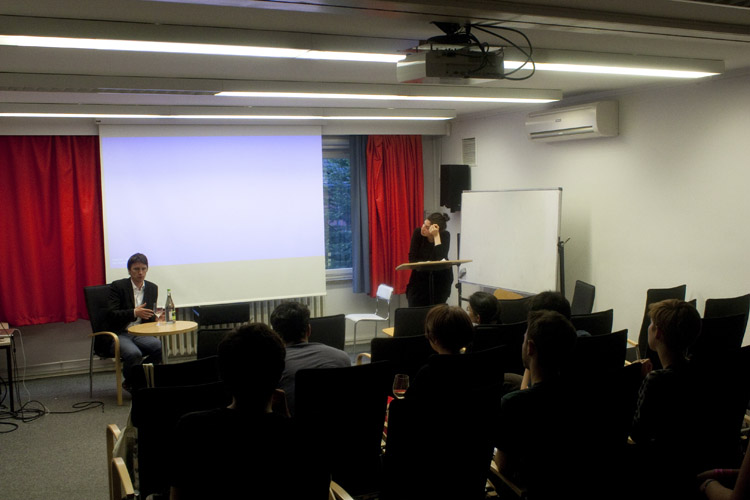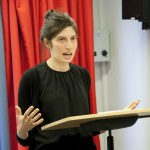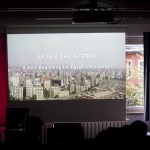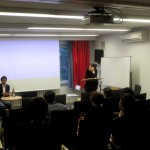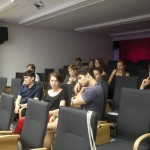On May 15th, ECLA of Bard had the pleasure and privilege to host a talk on post-revolutionary Egypt with Thomas Hasel, co-producer of the Deutsche Welle documentary After the Storm: A New Beginning for Egypt’s Economy, which deals with Egypt’s economy after Mubarak’s fall. The event was organized by ECLA of Bard’s Politics and Ethics concentration seminar Democracy: Ancient and Modern, taught by Professor Ewa Atanassow. The discussion was moderated by our BA2 student from Egypt Aya Ibrahim, who actively contributed to its course with her firsthand knowledge.
The screening of the documentary preceded an insightful talk with Thomas Hasel. Mr. Hasel is a German journalist and political scientist. Since 1994 he has specialized in political and economic systems in the Arab world and published a number of press articles on the Arab states in North Africa. His evident expertise and interest in the Egyptian situation made the discussion very lively and fruitful from the very beginning. Mr. Hasel was patient enough to answer our every question, and his answers were informative at all times.
The documentary After the Storm: A New Beginning for Egypt’s Economy deals with the development of Egypt’s economy after Mubarak’s fall, arguing that the revolution in early 2011 was a protest not only against an authoritarian ruler, but also against the country’s economic misery, corruption and unemployment rate. The film gave the audience enough background information on the current situation and helped us to better understand its practical underpinnings, which later inspired some very thought-provoking questions addressed to Mr. Hasel.
One of the main points highlighted by the documentary and raised by the students is the division between lower and upper social classes in contemporary Egypt. Between the uneducated poor majority and the privileged rich minority, there is little or no space left for the middle class. According to Hasel, bridging the gap between the rich and the poor is one of the major challenges Egypt faces today. A major change in politics and in economic policies is a necessary step in achieving this goal, he stated. Increasing taxes on the rich and educating the poor will gradually contribute to the creation of a strong middle class in the Egyptian society. However, with yet another delay of the Egyptian Parliamentary Elections 2013 to a possible date in October, these changes are unlikely to happen anytime soon.
Luckily, not everything is as grim as politics and economy in Egypt. The Arab Spring of 2011 involved a great number of educated youth who wanted to see a change in society, and are still actively working on achieving this goal. The authoritarian regime of Hosni Mubarak largely obstructed the formation and work of student unions, which are now becoming more and more popular at Egyptian universities, according to Hasel.
Nevertheless, there is a lot of work ahead. Most of the socially engaged youth have been educated at international schools and universities in Egypt, or have studied abroad. Hasel emphasized that education is a crucial step in the social awakening of Egyptian citizens. Sadly, it is still a very controversial one. Not many people can afford education at an international institution, and the education at state schools and universities is still majorly shaped in accordance with the old-fashioned framework of Mubarak’s regime. An educational reform is needed for a change in people’s mentalities and for consolidating a critical approach to the country’s politics. This would give people a clearer image of the necessary changes in economic and political policies, and would help them choose their leaders accordingly.
The relationship between education and political engagement argued by Hasel triggered another relevant question: why did the Muslim Brotherhood win the first democratic elections in Egypt in the first place? The answer to this is rather simple: due to good organization and a great network of connections. The Muslim Brotherhood had a great deal of influence throughout Egypt even during Mubarak’s regime. While the other parties were still organizing themselves and conceiving their plan of action, the Muslim Brotherhood had already formulated an agenda to help the country’s democratic transition. The problem that arose when they actually won the elections was that their plan was not supported by a strategy, added Aya, and that is why little progress has been made under their leadership.
The prognosis for Egypt’s current financial crisis engaged Hasel and the students in yet another political debate about possible solutions. The end of the crisis is all but certain, suggested Hasel. The most probable investors in Egypt’s economy at the moment are the IMF and Qatar, he added. However, these negotiations offer no guarantee. Giving money to Egypt is a dangerous investment, and the countries are afraid of not getting their money back. Additionally, Qatar and other Middle Eastern countries might see this as an opportunity to extend their sphere of socio-economic influence, which Egypt – a secular state – would not favor.
The talk with Mr. Hasel was concluded with a question on the possibility of a new revolution in Egypt or other Arab countries. Hasel suggested that another revolution in Egypt is highly unlikely, but that the danger of upheaval is not excluded in other Arab countries, such as Saudi Arabia, whose citizens share a great feeling of dissatisfaction and frustration with the socio-economic situation.
Altogether, the Democracy course could not have had a more appropriate ending than this evening on post-revolutionary Egypt. Revolution as a necessary step in the transition to a democratic society was a recurring theme in our recent classes, and the case study of Egypt showed its practical relevance. The example of Egypt unfortunately also reminded us that there are no shortcuts on the path to a true democratic society driven by notions of political freedom and equality, as well as that revolution only marks the first step of a long and challenging journey.
Photo gallery:

